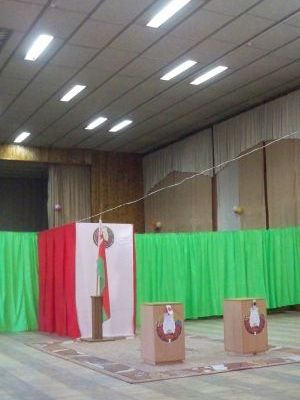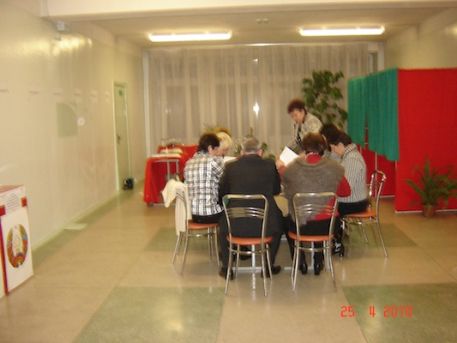I had a chance to observe the local election in Belarus on 25 April 2010. Together with an independent observer Aleś Č. we spent the whole day at polling station 18 in the Sucharava district of Minsk, where 7 candidates, perhaps the record number in this kind of elections, were running for a seat. The polling station was located in a school building. Two other stations of this most dynamic uptown district were situated at the same school.
This record is my humble reflection on what is being called ‘elections’ in Belarus.
And the election went through Twitter too
I felt that the election was really happening only when I left the polling station to take a small mid-day break. I logged into Twitter and saw real election battles: there, using a hash-tag #electby, observers, candidates, and ordinary users posted their 140-symbol sketches of the election. There were posting that somewhere a journalist was kicked out of a polling station, that a candidate was barred from conducting exit-polls, and how the head of one of the electoral committees was “an ass”. The contrast with my polling station was staggering. Meanwhile I got a message in my inbox from Aleś Łahviniec, a candidate for a municipal council seat. His proxy, a person, who was allowed to represent his interests, was arrested at a polling station the day before and was detained until Monday. This man had been trying to explain that family voting (more that one person in a polling booth) was a violation of the electoral code.
Red-greenness
The primary colours at all polling  stations were red and green. Understandably so, since these are the main colours of the Belarusian state ideology. However, red prevailed like in the Soviet times: red table clothes, a red jacket of an MP who showed up in the morning carrying a heavy maroon notebook. She made herself comfortable at a seat specially designated for observers and shot a glace at us: “Got questions?” “And who would you be?” The woman straightened her back and with a disdain in her voice toward us, mere mortals, relied: “I am a member of the national parliament.”
stations were red and green. Understandably so, since these are the main colours of the Belarusian state ideology. However, red prevailed like in the Soviet times: red table clothes, a red jacket of an MP who showed up in the morning carrying a heavy maroon notebook. She made herself comfortable at a seat specially designated for observers and shot a glace at us: “Got questions?” “And who would you be?” The woman straightened her back and with a disdain in her voice toward us, mere mortals, relied: “I am a member of the national parliament.”
That was Valancina Žuraŭskaja, a former head-mistress of the school where my polling station was. She had left to chair some vocational college and from there had gone to become an MP. Though not from this district. This time around it was a current head-mistress of the same school, a pro-governmental candidate, who was projected to win.
We shared with Žuraŭskaja that it was rather inconvenient to observe since there were those silly flower pots in front of us – we couldn’t see much, and that our seats were too far from the electoral commission table. The MP approached the EC head and said that it would be a good idea to move those plants. Flowers in pots were removed. Our seats moved closer. Other ‘observers’ (apparently, school teachers) did not wish to regroup nearer. But at least we could now hear what EC members were talking about with voters.
The electoral commission was composed exclusively from women, school teachers, led by a thickly moustached head of a local state-run maintenance service and his deputy, a young but exceptionally functional functionary. The absence of party or civil society representatives in the commission caused a very strong surprise to most British observers, who dropped by our very popular polling station around 2 p.m. However, the presence of foreign diplomats did not change the vote count much.
Of clouds and church bells
The polling station was drowning in  music beats: a kids song about clouds from speakers on the school entrance stairs, a trashy pop tune playing continuously in a hallway, where 9 grown men were hanging around sipping on some cheap brew. Ascending from the first floor, which looked more like an odd mixture of a lavish butcher’s shop and wine cellar, voters found themselves in a chanson paradise on the second. There, from a worn cassette player Shufutsinskij (a Russian chanson singer) whizzed about ‘bitter-sweet vodka’ and ‘church bells.’
music beats: a kids song about clouds from speakers on the school entrance stairs, a trashy pop tune playing continuously in a hallway, where 9 grown men were hanging around sipping on some cheap brew. Ascending from the first floor, which looked more like an odd mixture of a lavish butcher’s shop and wine cellar, voters found themselves in a chanson paradise on the second. There, from a worn cassette player Shufutsinskij (a Russian chanson singer) whizzed about ‘bitter-sweet vodka’ and ‘church bells.’
A red-green state flag, glued to olive school walls with an adhesive tape, was a slight touch to finish off an ideal harmony of a place where people were supposed to express their political wills.
In the afternoon state radio broadcast that, obviously, there had been no deviations and electoral fraud and that more than a half of voters had found their way to ballot boxes. Comparing with Ukraine, where I had observed the first round of the presidential election in January 2010, there were extremely few people coming to our polling station. One every other minute.
An average voter paid little attention to information about candidates hung not far from ballot boxes. Perhaps, one in twenty would come to posters where there were only pictures, name-surname, education and annual income of contenders. Though for many people the candidate’s income was crucial in helping to make a decision. People’s opinions, depending on a particular social group, ranged from a scornful ‘ooh, earned a lot – stole a lot’ to envious, in a good sense, ‘managed to provide for him/her self – knows how to work hard.’ Voters would approach a black-and-white poster, stare at a ballot paper for a minute, switch their gaze back to a poster, give the slightest of nods – a choice was made – and stagger towards polling booths. Voters with kids would give them a chance to deliver their papers into ballot boxes.
I was wondering whether a tenth part of those who made their way to ‘the election’ had any idea about candidates, save their info on black’n’white, official issue posters.
Election?!
That was how everything went up until the X hour – vote count.
 At 8 p.m. sharp polling station doors were sealed by police officers who suddenly materialised waving batons. Commission tables were moved to the centre of the room, 7-8 metres from where we were, and covered with green clothes. I got an impression that EC members, who sat in a semi-circle with their, pardon, bottoms in our faces, were about to play several hands of poker. Up until now we, independent observers, had been surrounded by gloomy 40-something school teachers, official state approved ‘observers.’ But at the momentous X hour two ‘heavy-weights’ of the electoral process, a lawyer and a candidate proxy Daša Katkoŭskaja accompanied by a retired army officer Alaksiej Kavalec, joined forces with us.
At 8 p.m. sharp polling station doors were sealed by police officers who suddenly materialised waving batons. Commission tables were moved to the centre of the room, 7-8 metres from where we were, and covered with green clothes. I got an impression that EC members, who sat in a semi-circle with their, pardon, bottoms in our faces, were about to play several hands of poker. Up until now we, independent observers, had been surrounded by gloomy 40-something school teachers, official state approved ‘observers.’ But at the momentous X hour two ‘heavy-weights’ of the electoral process, a lawyer and a candidate proxy Daša Katkoŭskaja accompanied by a retired army officer Alaksiej Kavalec, joined forces with us.
When the first batch of ballot papers had been tossed on the table Alaksiej began an offensive. It was impossible to see the count: EC members mingled papers around making signs and marks, driven by their own logic, and no one had a chance to look what they were up to. Alaksiej tried to approach the table, at least half a meter, closer but was immediately stopped by the EC head and later by a police officer – a young man barely 20 years old. With their eyes they drew a line which was not supposed to be crossed. When Daša made an attempt to photograph ‘the count’ the policeman ordered him to put the camera away. Daša refused. “I don’t allow you to make pictures!” the EC official roared. “Where is it written that I can’t?” Daša wailed back. “Show me where it is written that you can!” Daša went back to her seat and took the Electoral Code – a brand new volume with a red-white Pahonia (a former Belarusian cote of arms commonly used by democratic opposition) sticker on it.
The massive verbal brawl erupted between Daša, Alaksiej, the EC chair and the echoing him policeman. “Where is it written we are not allowed to photograph?” pointing her shaking hand towards the tables with ballots assorted in a comic solitaire, the girl was holding the Electoral Code in other hand with the camera tacked under her armpit. Her stare, full of rage and despair, was piercing the visibly greying EC chair. A confident look of well-tanned and stylishly clad Alaksiej complemented a tense and ridiculous picture. The picture, I am certain, I would remember for a long time. “I have the right to observe!” Alaksiej was defiant. “You are hampering the commission’s work!” gasping for air the chair shouted phrases prepared in advance; “Even in Zimbabwe they managed to hold dissent elections!” Alaksiej appealed to international practices.
The debate raged for another ten minutes. I felt that I was witnessing an epic battle between good and evil, love and hate, truth and lies. And I felt how righteous was my side – people who wanted to see the count and its shameless imitation. How justified were the claims of independent observers and how deceitful were replies of the EC chair. And how pleasant it was to be on the right side and not together with those, seemingly, ugly tastelessly made up 40- something school teacher, who, no doubt, were bribed with meagre bonuses and leftovers from the Election Day buffet.
In the end Daša kept her camera. She even managed to record a candid video. She also phoned a friend who, using a built-in voice recorder, documented everything that was happening at the polling station.
“It’s time to leave this carnival” Alaksiej nodded when all ballot papers had been counted, and headed for exit. It took the EC commission only 18 minutes to ‘count’ almost 1000 ballots.
The pinnacle was reached when the official result was announced – a doubtless leader got the second to last place with 3% of votes. The police officer, the one who tried to take the camera away from Daša, asked my collegue “How much did you get paid for staging all of this?” He said it honestly, with a smile – his young face was still capable of honest smiles.
We handed to the chair our report of complaints with violations: inability to clearly observe the count and restrictions to photograph the process. He quickly hid the report in a blue folder, tacked it under his arm, and put a telephone to his ear: “Get me a security escort. I am not going anywhere without it.”
Shortly after he was running from a school building protected on all sides by ape looking SWAT officers and jumped into a white sedan. Doors slammed and the car sped away. In a similar sedan the Beŭłarusy i Rynak reporter Vadzim Aleksandrovič was taken to a detention centre from a nearby polling station for attempting to take photos of ‘a vote count.’
In a while other EC memebers started to leave the building. They were carrying huge plastic bags with groceries from working all Election Day long cheap alcohol stands. From the looks of it they got their share free of charge.
“How did the election go?” my parents asked when I staggered home at 1 a.m.
“There are no elections in Belarus” I said. And I had nothing more to add, really.
–
26 April, Minsk (BelTA). More than 79% of voters took part in the local election, according to the Election Commission.
–
25 April, Minsk (Kaciaryna Niačajeva, BelTA). Accoriding to the Central Election Commission chair Lidzija Jarmošyna, the CEC received very few justified complaints about the Electoral Code violations during the local election.


